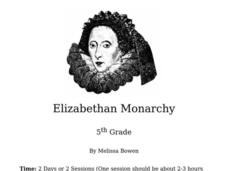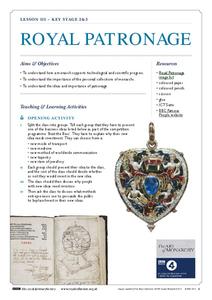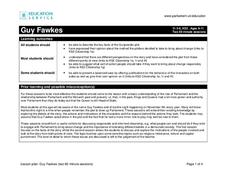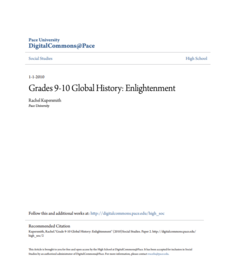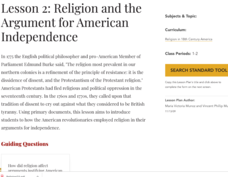Curated OER
Elizabethan Monarchy
Fifth graders explain the difference between democracy and monarchy. They see how the Queen Elizabeth and her Privy Council ran England. They explain the different terms involved in the Elizabethan government.
BBC
The Monarch's Changing Role
Though the grandeur and elegance of the British palace remains unchanged throughout history, the role of the monarch has shifted from absolute rule to collaboration with a constitutional parliament. Young historians learn about the...
Curated OER
Comparison of the powers and rules of succession of the European monarchy
High schoolers, after viewing a PowerPoint Presentation based on "Europe in the Round" data, explore, examine and develop an awareness of the range of powers held by the monarchy in Europe. They assess the rules of succession for...
Curated OER
Who's The Boss?
Upper elementary and middle schoolers research and analyze some different types of governments. Democracies, Monarchies, and Dictatorships are some of the types that are looked at. Learners use the Internet to gather information that...
BBC
The Role of a Monarch (key stage 2 and 3)
What makes a good monarch? Elementary and middle schoolers examine popular symbols of the British monarchy before designing a television advertisement about the qualities needed in a monarch. Next, they write poems using metaphors and...
Curated OER
My Way or the Highway
Students read "Saudis Uneasily Balance Desires for Change and Stability" from The New York Times and discuss Saudi Arabia as it considers a change from monarchy to democracy. Students work in groups to research and create timelines on...
School Improvement in Maryland
Political Systems: Advantages and Disadvantages
Every political system has advantages and disadvantages. To gain an understanding of these differences, groups investigate the political system of another country—oligarchy, monarchy, dictatorship, parliamentary—and prepare a...
BBC
Royal Patronage
The relationship between European royalty and the artists, scientists, and philosophers they support has been a building block in the artistic and technological progress throughout the world. Learn more about patronage throughout the...
BBC
Tudors: Life and Society
Here is an interesting activity that lets kids explore what life was like during the Tudor period. The activity is written two different ways, one for computer use and one without. It is also written with special instructions for...
US National Archives
The Royal Seal What Can It Tell Us?
Analyze the images and details of the Great Seal of Queen Elizabeth I, and discover clues that reveal how one of the greatest monarchs in the history of England wished to be seen and respected. This is a great way to discuss how even to...
Curated OER
Royal Treatment
Students analyze the Nepalese King's response to pro-democracy demonstrations, and examine existing monarchies around the world. They conduct research, read an article, and present information on various modern-day monarchies.
Curated OER
The Constitution: The Head of State
Learners explore politics by participating in a round-table discussion with classmates. In this monarchy instructional activity, students identify the different political leaders in Australia and conduct a class discussion about the...
Curated OER
Guy Fawkes
Sixth graders access their prior knowledge of the job of Parliament and its relationship to the monarchy. In this Gunpowder Plot lesson, 6th graders research the Gunpowder Plot, summarize key story ideas, and role play the plot. They...
Curated OER
"All Men Are Created Equal"
Students identify the premise of the United States' Democracy. They list the major elements of the document. Students reflect on the inequalities of the late 1700's premise of other units. They complete a KWL chart about the Declaration...
National Endowment for the Humanities
Chief Executives Compared: The Federalist Papers
Delve into the responsibilities of the president by looking at President Hamilton's opinion of the presidential office in his own words. The second in a three-part series, the resource also offers an interesting compare-and-contrast...
Curated OER
Marie Antoinette: The Tragic Queen
Students view a documentary on Marie Antoinette, who became a symbol of the reviled monarchy. After viewing, students discuss what they saw then create a family line of Marie Antoinette. They compare maps of Europe from her time to ours.
Pace University
Global History: Enlightenment
The core ideas of the Enlightenment—reason, knowledge, and freedom—represented a rebellion against the despotic control of absolute monarchs. As part of the study of the movement, class members assume the voice or either a monarch or an...
Curated OER
Lesson: Storyboarding Revolution
Kids consider revolution as a basis for creativity, art, and storytelling. After reading an excerpt from the book, Persepolis, learners choose one event from any world revolution to write about. They storyboard the event focusing on...
Curated OER
What Experiences Shaped the Founders' Thinking about Government?
Students study the ideas and experiences that shaped the founding fathers' perspective about government. In this the government lesson plan, students examine the Articles of Confederation as they relate to the power of government....
Curated OER
Creating a Government
A simulation gives scholars a personal look at what goes into forming a government. Each of them is assigned 1 of 4 tribes which make up Borka, a hypothetical country. The tribe distribution is based on the percentage of people in each....
Curated OER
The War in the South, 1778-1781
Students explore the major terms of the Franco-American alliance and their importance to the cause of independence. The most important military engagements in the South are discussed and their significance for the outcome of the war noted.
National Endowment for the Humanities
Lesson 2: Religion and the Argument for American Independence
Young scholars examine how religion affected arguments justifying American independence. They read and analyze primary source documents, and write an essay analyzing how Americans used religious arguments to justify revolution against a...
National Endowment for the Humanities
The War in the South, 1778–1781
The second in a three-part look at the Revolutionary War focuses the years from 1778 through 1781 and zooms in on military operations in the southern colonies, the French alliance, and the role African-Americans played in events. Class...
Facing History and Ourselves
The Weimar Republic: Historical Context and Decision Making
Did you know that way before Hitler became a dictator, he actually spent nine months in a German jail? Provide the background for the escalating point before the Nazi party took over in World War II through the exercises in the resource....
Other popular searches
- Absolute Monarchy
- European History Monarchy
- Constitutional Monarchy
- English Monarchy
- Oligarchy Democracy Monarchy
- History Absolute Monarchy
- Elizabethan Monarchy
- British Monarchy
- Charles v Monarchy
- French Monarchy
- Monarchy Oligarchy
- 3 Absolute Monarchy


